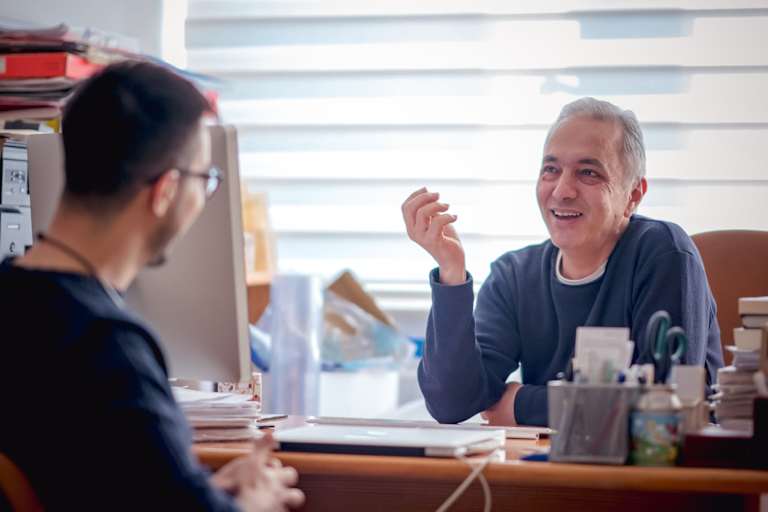Ask a Professor: How to Ask Your Professor to Be a Reference
- Professors can be a professional reference in addition to providing academic references.
- Choose the right professor as a reference to boost your job prospects.
- A brief email with supporting information can help you get a reference from a professor.
- Make sure to thank your professor for providing a reference.
Recent college grads sometimes struggle to find references for their job search. Who can you ask to be a reference if you have limited professional experience?
In many circumstances, it makes sense to ask a professor to be a reference.
While professors often write letters of recommendation for grad school applications, they also serve as professional references.
When should you ask a professor to be a reference? And how should you request a reference from a professor?
When to Use a Professor as a Reference
Professors make great references. But in some circumstances, a professor might not be the best option for a professional reference. Here are some situations where it makes sense to ask a professor to be a reference.
Professors Related to Your Career Path
If you’re an accounting major applying for entry-level accounting jobs, it makes sense to ask an accounting professor to serve as a professional reference. Similarly, if you’re an education major looking for your first teaching job, an education professor can be a solid reference.
Professors Who Speak to a Skill
Employers look for certain skills that professors witness in the classroom. If you completed a multi-step project in a class, the professor can speak to your organizational and time-management skills.
If you aced a public speaking assignment, the professor can discuss your strong presentation skills.
Professors With Industry Connections
Many professors have a good reputation outside of academia. Instructors with industry connections know your academic strengths and how they will transfer into specific roles. These professors make strong references.
Research or Independent Study
Taking a class with a professor can make them a good fit as a reference. But working more closely with a professor can make them a stronger reference.
For example, did you gain research experience as an undergrad? Did you complete an independent study with a professor? These professors make good references because they worked closely with you for an extended time.
How to Choose a Professor to Be a Reference
Which professor should you ask to be a reference? First, make a list of professors who can speak to your strengths.
That might include professors in your major or minor, instructors in classes where you performed well, or those who taught courses with career-related skills like research, public speaking, or project management.
Next, make a list of professors who match the jobs you’re targeting. If you’re applying for entry-level business careers, then business professors might make sense. On the other hand, if you’re applying for tech jobs, list your computer science professors.
Finally, list which professors you worked closely with. Include instructors who supervised an independent research project, acted as a mentor, or hired you as a research assistant.
Review your lists. If one name appears on multiple lists, that’s your best choice for a reference. You can also ask multiple professors to serve as references for different jobs.
4 Tips for Asking Professors to Be a Reference
You’ve narrowed down your options to a few professors. How should you ask a professor to be a reference? Follow these tips to increase your chances that a professor will serve as your reference.
1. Send an Email
You can ask a professor to be a reference after class or during office hours. But the easiest way to ask for a reference is via email. When you send an email, you can plan out what you want to say and include relevant information.
Plus, it gives your professor time to consider the request.
2. Keep It Brief
Professors are busy, so keep your reference request brief. In fact, you can ask for a reference from a professor in just a handful of sentences.
Open by introducing yourself and letting them know about your career goals. Tell them why you’re hoping they will serve as a reference. Then, ask if they’re willing to provide a strong reference.
3. Provide Supporting Information
Your professor will give a stronger reference if you offer supporting information. If you worked on a major assignment in their class, attach the finished project. Provide a copy of the resume you’ll use to apply for jobs. And give them copies of your cover letter, if possible.
These resources will help your professor offer information geared to specific jobs, which will boost your chances on the job market.
4. Make Their Role Clear
When asking for a reference from a professor, be as clear as possible about what you need from them. Are you simply planning to list their contact information on job applications? Or do they need to fill out a form? Will a recruiter contact them?
Your professor will more likely say yes if they know what to expect as your reference.
Email Templates for Asking a Professor for a Letter of Reference
Not sure how to ask a professor to be a reference? Check out the following examples for ideas. Make sure to personalize your request so that it doesn’t look like a form email.
Hello Prof. [Name],
I took your Marketing 445 class last fall, and I’m currently applying for market research analyst jobs. These positions emphasize organizational and communication skills, which I demonstrated on the competitor analysis project for your class.
Are you open to providing a professional reference for my file? To serve as a reference, you would write a short letter of reference for my credential file at the career services office. I’ve attached a copy of my final project for your class along with a resume and draft cover letter. Please let me know if I can provide any additional information.
Dear Dr. [Name],
I’ve learned a lot as your research assistant, and I plan to apply the analytical methods from your project in my career as a data scientist.
Would you be willing to serve as a reference for my job search? I would appreciate it if you could speak to my technical and teamwork skills in particular. If you’re open to being a reference, I would list your contact information on my job applications. See below for my resume and cover letter, and thank you for your time.
How to Thank Your Professor for a Reference
If your professor agrees to be a reference, make sure to thank them. Send a quick email to say thank you, and keep your professor updated on the job search.
Professors willing to serve as a reference always appreciate hearing follow-ups. So reach out to your professor after you land a job, especially if they gave a strong reference.



